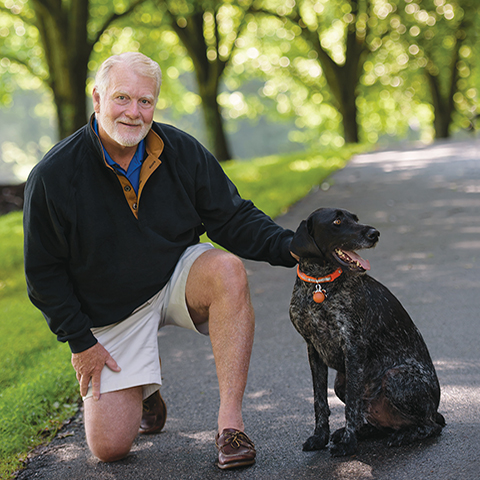Chris's Story

“If you start having stroke symptoms, you need to get to the emergency room right away. If you react quickly, then you can have a good outcome, like me. I have my wife and Holy Cross Germantown Hospital to thank for that.” - Chris Moody
Although he has retired, long-time Gaithersburg resident Christopher Moody, 75, likes to keep busy. He and his wife of 48 years, Susan, enjoy traveling, and Chris loves to play classical guitar, work on his golf game, and read.
One Saturday in March 2017, Chris was reading the morning paper when he suddenly started to have trouble understanding the words on the page. This had happened a few times before, and he had attributed it to a migraine headache. So he did what he always did—took some aspirin and went to lie down in a dark room.
But this time was different.
“When Susan came up a few minutes later to check on me, she took one look at me and knew right away that something was seriously wrong,” Chris says.
Fifteen minutes later, Chris and Susan arrived in the Emergency Department at Holy Cross Germantown Hospital, where, as a Primary Stroke Center, the hospital’s stroke team was ready.
“As soon as Susan said the words ‘possible stroke,’ everyone sprang into action. Within a minute, I was in an examination room doing a neurological exam and preparing to get a CT scan of my brain,” Chris explains.
Allen Silfee, MD, Emergency Medicine, Holy Cross Germantown Hospital, quickly diagnosed that Chris was suffering a stroke caused by a blood clot in his brain. Stroke is the leading cause of long-term disability in the United States.
The stroke team quickly and calmly worked through stroke protocol, as Chris’ condition steadily deteriorated. He lost the ability to speak about 10 minutes after he arrived. But because Susan took Chris to Holy Cross Germantown Hospital right away, he was able to receive the clot-busting drug tPA (tissue plasminogen activator), which restores blood flow to the brain and may stop an ischemic stroke. tPA can be given to patients who meet certain criteria within a three to four-and-a-half hour window from the start of a stroke.
“Dr. Silfee was instrumental in getting Chris the care he needed,” explains Susan.
Comprehensive Stroke Care
“A fast, accurate diagnosis and rapid treatment can minimize the negative effects of stroke and greatly improve patient out- comes,” says Shahid Rafiq, MD, medical director, Neurology and Stroke, Holy Cross Health.
As needed, stroke patients at Holy Cross Germantown Hospital and Holy Cross Hospital may receive inpatient rehabilitation services, including speech, occupational and physical therapy, before continuing recovery at home or at an acute care rehabilitation facility. Patients can also benefit from Holy Cross Health’s comprehensive Neuroscience Program, including preventive medicine, community health services, support groups, rehabilitation, education and coordinated follow-up care.
On Monday morning—just two days after his stroke—Chris woke up in the hospital feeling like his old self. He picked up the phone and called his wife to say good morning and talk.
“The fact that he could string all of those words together after losing his ability to speak was amazing,” Susan says.
On Wednesday morning, Chris went home with no lingering effects from his stroke.
“I thought Holy Cross Germantown Hospital was great. They responded quickly and professionally. It’s close to us, it’s a fabulous facility, and the people who work there are excellent,” says Chris. “It was a wonderful experience and a great outcome.”
